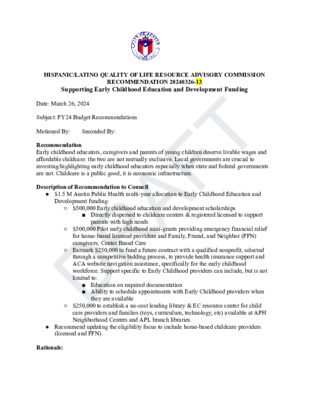Draft_HLQoL Commission_FY 24-25 Supporting Early Childhood Education and Development Funding — original pdf
Backup

Motioned By: Date: March 26, 2024 HISPANIC/LATINO QUALITY OF LIFE RESOURCE ADVISORY COMMISSION RECOMMENDATION 20240326-13 Supporting Early Childhood Education and Development Funding Subject: FY24 Budget Recommendations Description of Recommendation to Council ● $1.5 M Austin Public Health multi-year allocation to Early Childhood Education and Recommendation Early childhood educators, caregivers and parents of young children deserve livable wages and affordable childcare: the two are not mutually exclusive. Local governments are crucial to investing/highlighting early childhood educators especially when state and federal governments are not. Childcare is a public good, it is economic infrastructure. Seconded By: D R A F T parents with high needs they are available ○ $500,000 Pilot early childhood mini-grants providing emergency financial relief for home-based licensed providers and Family, Friend, and Neighbor (FFN) caregivers; Center Based Care ○ Earmark $250,000 to fund a future contract with a qualified nonprofit, selected through a competitive bidding process, to provide health insurance support and ACA website navigation assistance, specifically for the early childhood workforce. Support specific to Early Childhood providers can include, but is not limited to: ■ Education on required documentation ■ Ability to schedule appointments with Early Childhood providers when care providers and families (toys, curriculum, technology, etc) available at APH Neighborhood Centers and APL branch libraries. ○ $250,000 to establish a no-cost lending library & EC resource center for child ■ Directly dispersed to childcare centers & registered licensed to support ○ $500,000 Early childhood education and development scholarships Development funding: ● Recommend updating the eligibility focus to include home-based childcare providers (licensed and FFN). Rationale: The cost of childcare is one of the biggest expenses families face. It is a daunting task to find affordable, high quality childcare. According to UT News, “The average cost for infant care in Texas is $777 per month, or $9,324 per year — nearly 14% of the state’s median household income of $67,321 and more expensive than a year of in-state tuition at a four-year public college.” Every child in Austin should be able to access high quality childcare without causing financial strain on the family. Childcare providers may encounter financial burdens that make it difficult for them to provide services on a consistent basis. Unexpected issues can derail childcare services. It can take time to navigate insurance claims while continuing to try and run a business. There are times the home-based childcare center may have to close as a result of the issues/damage. Emergency financial relief for home-based licensed providers and Family, Friend, and Neighbor (FFN) caregivers can prevent childcare providers from losing income. This provides stability for the childcare provider, and they no longer fear the possibility of having to close their business, which in turn also provides stability for the family utilizing their services. According to UT News, “Texas child care workers earn poverty-level wages, with an average wage of $12 per hour.” Childcare providers are already struggling financially, and they may not have access to health insurance. Providers may have to pay for health insurance through the marketplace, which can be a difficulty to navigate. Childcare providers benefit from health insurance support and ACA website navigation assistance. FFN caregivers represent communities that are disconnected from resources. A no-cost lending library and early childhood resource center for child care providers and families (toys, curriculum, technology, etc) gives providers the ability to access items they may not be able to afford on their own. D R A F T Eligibility should focus to include home-based childcare providers (licensed and FFN). Family, Friend, and Neighbor (FFN) providers include grandparents, aunts, family friends and neighbors. They are the mainstay of the child care sector. Spanish-speaking parents prefer home-based care to center care. The FFN workforce is 97% women and 50% people of color (compared to 40% of color among licensed child care workers) and the FFN workforce is overrepresented by immigrants. Vote For: Against: Abstain: Absent: Attest: Amanda Afifi, Chair Family, Friend and Neighbor Child Care: Supporting Diverse Families and Thriving Economies - https://homegrownchildcare.org/wp-content/uploads/2022/06/HomeGrown-Supporting-Diverse- Families-Thriving-Economies-final-6.2.22.pdf UT News Texas Continues To Face Child Care Accessibility Crisis - https://news.utexas.edu/2024/03/20/texas-continues-to-face-child-care-accessibility-crisis/ D R A F T